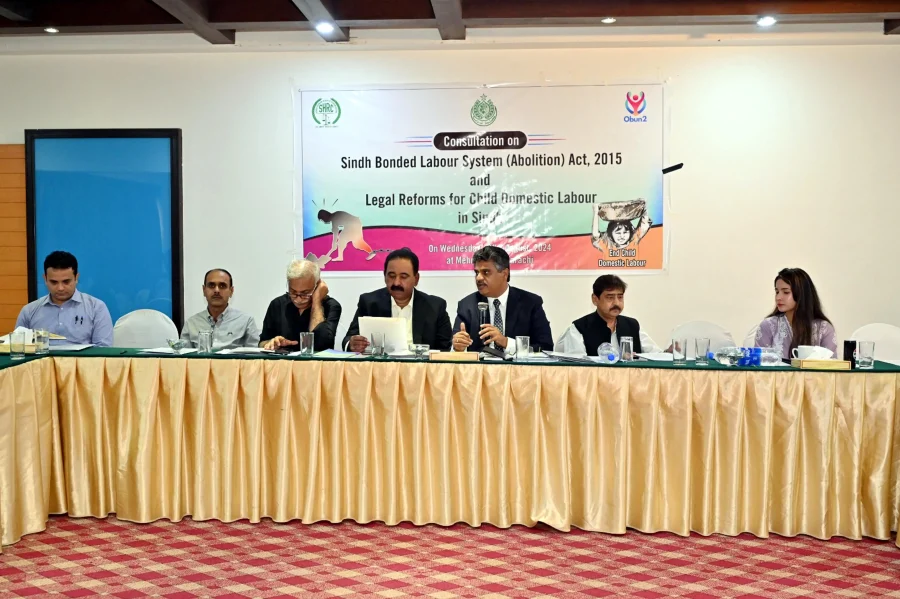The Sindh Human Rights Commission (SHRC), in collaboration with Obun2, held a consultation in Karachi to address the issues of bonded labour and child domestic labour in Sindh. The event, chaired by ShahidAbdul Salam Thahim, Sindh’s Minister for Labour& Human Resources, aimed to identify gaps in current laws and propose a framework for necessary reforms. Shahid Abdul Salam Thahim highlighted that while the Sindh Bonded Labour System (Abolition) Act 2015 and other related laws are in place, their enforcement needs enhancement.
He committed to addressing the identified loopholes and incorporating suggestions from the consultation, emphasizing the importance of strengthening the National Institute of Labour Administration and Training (NILAT) for education and training on these issues. Iqbal Ahmed Detho, Chairperson of the SHRC, opened the consultation by discussing the legal framework surrounding bonded labour, including Articles 11 and 3 of the Constitution.
He reviewed the Bonded Labour System (Abolition) Act of 1992 and its subsequent development, noting that after the 18th Amendment, Sindh enacted its own Bonded Labour System (Abolition) Act of 2015. Detho also stressed the need for improved monitoring and legislative scrutiny. Syed Nazar Ali, Secretary General of the Employer Federation of Pakistan, underscored the importance of involving genuine stakeholders and addressing contributing factors such as COVID-19, climate change, and poverty in reform efforts. He stressed the need for robust labor laws in Sindh. QindeelShujaat, Executive Director of Obun2, highlighted the critical issue of child domestic labour, emphasizing the need for a unified approach across provinces. She welcomed the Sindh Domestic Workers Bill but noted the necessity of learning from other provinces to address implementation gaps. RidaTahir, Legal Consultant at SHRC, pointed out that a significant number of children are engaged in domestic labour. She discussed relevant legislation, including the Prohibition of Employment of Children Act, 2017, and the Sindh Child Protection Authority Act, 2011, amended in 2021 to include child domestic labour in its definition of child abuse. ShahidShafique, District and Session Judge at Sindh Judicial Academy, noted that poor investigative practices and a lack of understanding of legal frameworks contribute to low conviction rates in cases of forced marriages and bonded labour.
ZahidGulzarShaikh, Regional Director of Labour, Shops & Commercial Establishment
Division, suggested that District Vigilance Committee meetings be conducted more regularly and that existing mechanisms be reviewed. Shafqat Ali Larik, Section Officer at the Legislation Law Department, advocated for improving legal frameworks by addressing identified loopholes through interdepartmental consultations. Muhammad Rafique, a Human and Labour Rights Expert, emphasized the need to understand the local context to develop and implement effective solutions. Representatives from various organizations, including the National Trade Union Federation, Hari Foundation, Nari Foundation, SPARC, LRF, Initiative, and CSSP, also participated in the discussion. SHRC raised concerns about the police’s failure to properly include sections of the Sindh Bonded Labour Abolition Act in FIRs and called for strengthening NILAT and the Sindh Labour Academy. The consultation revealed that only 12 of Sindh’s 29 districts have established District Vigilance Committees (DVCs). Discussions also addressed challenges such as the Sindh Labour Code, legislative and structural issues, data gaps, power imbalances, and the need for enhanced social security.










